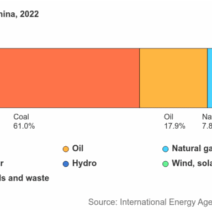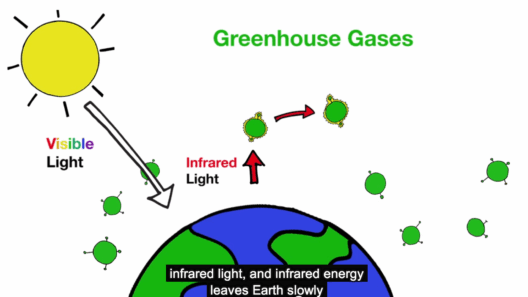The escalating crisis of global warming impels an urgent reevaluation of our contemporary paradigms. As temperatures rise and the impacts of climate change become increasingly palpable, the call for innovative, multifaceted solutions is more pressing than ever. The future hinges on our ability to embrace a *smorgasbord of solutions*, a varied palette of strategies and technologies that together can address the complexities of climate change.
To commence, it is pivotal to recognize the inherent potential of renewable energy. Solar, wind, hydroelectric, and geothermal power represent not merely alternatives but constitute essential cornerstones in the quest for sustainability. Harnessing solar energy through photovoltaic cells or concentrated solar power systems offers an unprecedented opportunity to derive clean, inexhaustible energy from the sun. Equally, onshore and offshore wind farms, with their vast installations, exemplify how nature’s power can be converted into a reliable energy source. However, the transition to renewables requires not just infrastructure but also a cultural shift—individuals must be willing to incorporate these energy sources into their daily lives, and policy frameworks must encourage such shifts.
In addition, the concept of energy efficiency cannot be overstated. Improvements in energy efficiency can significantly reduce the carbon footprint of buildings, vehicles, and industries. Retrofits of existing structures with energy-efficient technologies like LED lighting, smart thermostats, and advanced insulation materials showcase how we can optimize existing resources. Furthermore, the advent of smart grids, which facilitate more efficient energy transmission and distribution, heralds a new era in energy consumption. These grids utilize real-time data to balance supply and demand, ultimately enhancing the resilience of communities against climate variability.
Adopting sustainable agricultural practices also reveals avenues for mitigating global warming. The agricultural sector is a noteworthy contributor to greenhouse gas emissions. By instituting regenerative agriculture—which emphasizes soil health, polyculture, and reduced chemical inputs—farmers can not only improve crop yields but also sequester carbon in the soil. For example, cover crops and reduced tillage can enhance soil structure and biodiversity, while simultaneously drawing down atmospheric carbon. Beyond improving food security, these practices foster ecosystems that are more resilient to climate extremes.
Urban areas, where the majority of the global population resides, present both challenges and opportunities in our climate journey. Cities are often perceived as climate culprits, but they also have unparalleled potential to spearhead transformative change. Initiatives like urban forestry, green roofs, and sustainable public transport systems are not merely aspirational; they can mitigate urban heat islands, reduce energy consumption, and enhance air quality. For example, integrating green spaces in city planning can offer recreational areas while simultaneously sequestering carbon and enhancing biodiversity. Thus, cities must be viewed as laboratories of innovation where sustainable practices take root and flourish.
As we address global warming, we should not overlook the significance of technological innovation. Carbon capture and storage (CCS) technology holds promise as a tool for directly addressing emissions from power generation and industrial processes. Capturing carbon dioxide at its source before it enters the atmosphere can mitigate the effects of fossil fuel dependency. Furthermore, the burgeoning field of biotechnology is producing promising solutions such as biofuels developed from algae and other organic materials, paving alternative pathways to energy consumption. Such technologies may allow humanity to continue utilizing energy systems reliant on fossil fuels, albeit in a manner that ideally reduces net emissions.
Social and behavioral changes are equally indispensable to our collective response to global warming. Public awareness campaigns are essential to educate and empower individuals to make informed choices. Simple lifestyle changes, such as reducing meat consumption, utilizing public transportation, and adopting a zero-waste lifestyle, can cumulatively yield substantial reductions in greenhouse gas emissions. The fostering of a global climate consciousness can manifest in grassroots movements, urging corporations and governments alike to adopt sustainable practices. This cultural revolution, rooted in environmental stewardship, is paramount—it hinges on the understanding that individual actions, when multiplied, wield extraordinary influence.
Advocacy for sound climate policy forms the backbone of these individual and collective efforts. Governments must enact and enforce stringent regulations to limit carbon emissions and promote sustainability. Transitioning from fossil fuel subsidies to incentives for renewable energy development is a critical first step. Policymakers should also explore innovative frameworks such as carbon pricing or cap-and-trade systems that require polluters to bear the financial burden of their emissions. Engaging both local communities and international coalitions, innovative policies that stimulate green technology investments can cultivate an environment ripe for solutions.
Finally, the role of international cooperation cannot be overstated in addressing the multifaceted challenge of global warming. Climate change is a *global* phenomenon, transcending national borders and inequities. Collaborative initiatives—such as sharing technology, financing climate resilience projects in developing nations, and establishing shared environmental goals—are critical to achieving meaningful progress. The collective effort to forge a unified response to climate change, through entities such as the Paris Agreement, exemplifies the potential of global solidarity in combating a universal threat.
In light of the myriad of strategies available, it becomes evident that we are not merely passive observers in the face of global warming; rather, we are empowered agents of change. The courage to embrace a *smorgasbord of solutions*, melded with collective action and an unwavering commitment to sustainability, presents a pathway toward mitigating the dire prospects of climate change. Each solution, from renewable energy to innovative policies, contributes to the intricate tapestry of climate resilience, underscoring the critical need for collective vigilance and action in safeguarding our planet’s future.








